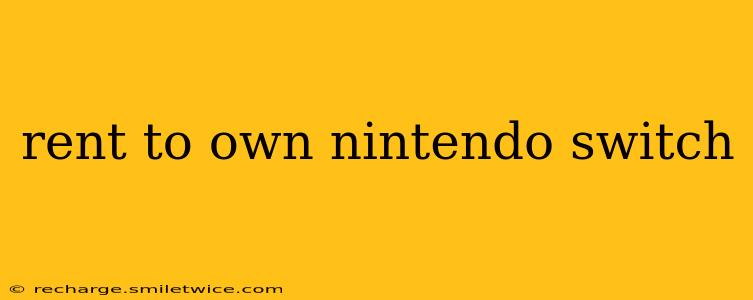The Nintendo Switch has taken the gaming world by storm, offering a unique blend of handheld and console gaming. But with its price tag, purchasing one outright can be a significant investment. This leads many gamers to explore rent-to-own options. This guide will delve into the pros and cons of renting a Nintendo Switch, helping you decide if this financial approach is the best fit for your gaming needs.
What is Rent-to-Own?
Rent-to-own (RTO) programs offer a way to acquire a product, in this case, a Nintendo Switch, through a series of rental payments. After a set period and the completion of all payments, the ownership of the console transfers to you. It's essentially a financing option, but often with higher overall costs compared to a direct purchase.
How Does a Rent-to-Own Nintendo Switch Work?
The specific terms of a rent-to-own agreement vary depending on the provider. Typically, you'll pay a monthly fee for a specified duration. This fee covers the rental of the console, and a portion goes towards the eventual purchase price. If you fail to make your payments, you'll lose the console and the money already paid. Always read the fine print carefully before signing any contract.
Is Rent-to-Own a Good Idea for a Nintendo Switch?
This depends entirely on your individual financial situation and priorities.
Pros:
- Accessibility: RTO allows immediate access to the console, avoiding the upfront cost of a purchase. This is particularly beneficial for those with limited savings.
- Budget-Friendly Payments: Spreading the cost over several months makes the purchase more manageable.
Cons:
- Higher Total Cost: Rent-to-own programs generally cost more than buying outright. You'll end up paying significantly more than the retail price.
- Risk of Loss: If you can't keep up with payments, you'll lose both the console and the money you've already paid.
- Limited Options: Finding reputable rent-to-own programs specifically for gaming consoles might be challenging. Many programs focus on larger appliances or electronics.
Where Can I Find a Rent-to-Own Nintendo Switch?
This is where things get tricky. Major rent-to-own retailers rarely specialize in gaming consoles. Your best bet is to explore options like:
- Local Electronics Stores: Some smaller electronics retailers might offer in-house financing options, which could be similar to a rent-to-own plan. Inquire directly with your local stores.
- Online Marketplaces (with caution): Be extremely careful when exploring online marketplaces. Verify the seller's legitimacy and ensure you understand the terms of any agreement before making a payment. Avoid anything that seems too good to be true.
What are the Alternatives to Rent-to-Own?
Before committing to a rent-to-own agreement, consider these alternatives:
- Saving Up: While it requires patience, saving up for a Nintendo Switch is the most cost-effective approach.
- Buying Used: Purchasing a pre-owned console can significantly reduce the upfront cost.
- Layaway Plans: Some retailers offer layaway plans where you pay a deposit and make regular payments until the purchase is complete. This is a much more consumer-friendly approach than a true rent-to-own program.
Are there any hidden fees with Rent-to-Own Nintendo Switch plans?
Yes, there's always a risk of hidden fees. Be sure to carefully read the contract before signing anything. Late fees, early termination fees, and other charges can significantly increase the overall cost.
Can I return a rent-to-own Nintendo Switch?
The terms of a return are entirely dependent on the specific contract you sign. Many rent-to-own agreements don't allow for returns, especially once payments have begun.
Conclusion: Weigh Your Options Carefully
While rent-to-own offers a seemingly convenient path to owning a Nintendo Switch, it’s crucial to weigh the potential drawbacks. The higher total cost and the risk of losing both the console and your payments make it a less favorable option compared to saving up, buying used, or exploring layaway plans. Thoroughly research any rent-to-own program before signing any agreements, and always prioritize transparency and clear contract terms.
